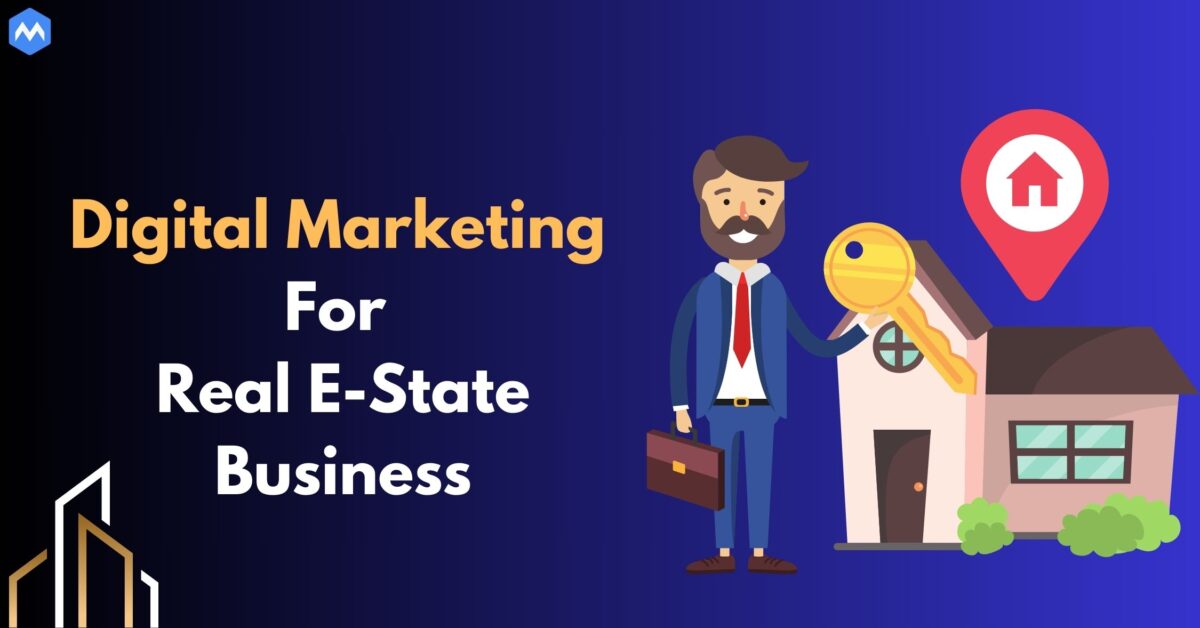How Beneficial is Digital Marketing for Real E-state Business?
Digital marketing has revolutionised many domains, including the housing market. Transitioning from conventional marketing approaches to online platforms provides many advantages, including access to larger audiences and in-depth analytics for strategy enhancement.
Digital marketing uses product and service promotion channels like social media websites, email, and search engines. The distinct advantage of digital marketing to the real estate industry, which relies essentially on aesthetics, is its visual attractiveness.
This composition will discuss the aspects of the real estate business, how digital marketing can positively impact it, and the implementation methods.
Why Digital Marketing is Essential for Real Estate Enterprises?
Digital ecosystem is a thriving community where users are engaged. Various reports suggest that these people number up to 5.1 billion. The demand for accommodation and a high number of prospective buyers create the basis of efficient digital marketing for real estate sector.
However, it is exactly this very reason which makes real estate business so competitive. Therefore, as a realtor or home owner it would be in your best interest to understand how digital marketing can help you outsmart your competitors. The advantage of internet marketing is that it enables multiple channels through which potential customers can be reached.
Digital marketing strategies vary from very basic ones to sophisticated ones or even trending ones that you can easily find and make use of. Additionally, digital marketing is known for its precision.
There are precision data-driven algorithms that cross several ways of marketing such as focused advertising along with personalized search results online. The availability of technology and data today has made it easy for anyone to digitize their enterprise.
The Benefits of Digital Marketing for Real Estate Company
Enhanced Visibility and Reach
Global Audience
One of the notable things about Digital Marketing for Real Estate is that it has the potential to reach a global audience. Instead of focusing on specific neighborhoods or regions as in traditional methods, property advertisers can display their properties to prospective clients wherever they are by use of digital platforms.
Targeted Advertising
Digital marketing facilitates drastically targeted advertisements. There are advanced targeting alternatives available on platforms like Facebook or Google based on a person’s demographics, interests, behaviour and place; making it possible for targeted marketing campaigns to be sent out only to those with greater possibilities for purchasing thus improving conversion rates.
Search Engine Optimization (SEO)
The foundation of every digital marketing strategy is search engine optimisation (SEO). By tweaking the websites and content they have for search engines, practitioners in the real estate sector can increase how visible they are on SERPs.
Cost-Effectiveness
Lowered Advertising Expenses
Costs that come from digital marketing are much lower in comparison to the traditional types of marketing like print media, billboards and TV advertisements. Online advertising platforms are enabling businesses start at a low budget and explode as they receive more positive outcomes.
Costs of Pay-Per-Click (PPC) Advertising
Real estate firms using PPC ads on Google or social networks will only pay for their ads when someone clicks on them. This way, the money set aside for promotion goes to people interested in the home, increasing the return on investment ( ROI).
Engaging Content and Visual Appeal
High-quality Visuals
Real estate marketing depends on visual attraction as a major component. For instance, digital marketing employs high definition images, vi and virtual tours in order to reflect current PR and operations. These images enhance listing attractiveness hence making them more appealing to possible purchasers.
Virtual Tours and 3D Walkthroughs
The Use of Virtual Tours and 3D Walkthroughs Potential buyers can benefit from virtual tours and 3D walkthroughs by getting a feeling of the place they might be interested in. Buyers can browse properties from their living rooms and have a fair idea about the size and feel of it. Therefore, this saves time for both buyers and agents because it removes the unnecessary viewing of houses that could have been done by those who are not planning to purchase anyone.
Content Marketing
Content marketing is about creating good quality stuff that others will want to consume; it’s no surprise that this approach still tops even today when everything is done online. This might occur via blogs for real estate businesses containing articles, infographics, videos showing how to buy a home, or other helpful information on neighborhoods and property markets; such information builds confidence with would-be clients, establishing authority for the company within its respective industry segment.
Enhanced Customer Engagement
Social Media Interaction
Real estate companies can interact with their audiences directly through social media platforms like Facebook, Instagram, LinkedIn and Twitter. They can respond to inquiries through postings (posts), updates of stories (story update), live videos (live video) and comments, thereby making connections.
Email Campaigns
Email marketing is still one of the most cost-effective ways of generating sales leads while keeping existing clients happy. Real estate agents should always send emails tailored to individual prospects containing property listings, market updates, and other promotional offers that will keep possible customers informed regarding new developments.
Chatbots and AI
Chatbots and AI-powered customer service tools offer timely feedback about frequently asked questions, thus increasing consumer satisfaction levels. They can also record client preferences and analyse their behavior so that the business can modify its marketing approach more efficiently.
Detailed Analytics and Data-Driven Decisions
Tracking of Performance
Analytics and performance-tracking tools are materialised in digital marketing platforms. The effectiveness of all campaigns can be monitored; website traffic can be tracked, user behavior can be analysed, and a real estate business can measure conversion rates. By doing so, one will know what works and what doesn’t and thus can improve consistently.
A/B Testing
In A/B testing, two versions of a marketing asset, e.g., an advertisement, mail, or landing page, are produced and tested against each other to establish which one performs better. This technique identifies the most effective elements in optimising marketing strategies.
Customers Insights
Digital marketing gives essential information on how customers select products and their behaviors and demographic characteristics. Real estate firms may enhance their services by analysing these data, thus better understanding their potential clients.
Read More: How to Evaluate the Credibility of a Digital Marketing Agency in Surat
Building Brand Authority and Trust
Online Reviews and Testimonials
Boosting the credibility and reputation of any real estate business is highly dependent on positive online reviews and testimonials. Satisfied customers leaving comments on sites like Google My Business, Yelp, etc., can easily lead to recruiting new clients into the company’s fold and creating trust.
Expert Content
The real estate business will project itself as an authority in that field by sharing expert content like market analyses, investment tips, and industry trends. It attracts potential buyers while building long-term trust through loyalty.
Social Proof
Potential buyers’ decisions can be influence through social proof – by showing successful sales or giving client testimonials or even awards. Posting these accomplishments on websites and social media profiles will improve the credibility of businesses.
Flexibility and Scalability
Adaptability
Digital marketing strategies can be formally adapte in moments based on the performance data and market changes. This adaptability enables real estate firms to remain at the forefront of the trends and change their tactics concerning changing customer requirements.
Scalability
Digital marketing campaigns can be enlarge to fit a company’s needs and budget. Digital platforms have all that is require to manage campaigns of any size for a local market and those around the globe.
Case Studies and Success Stories
Increase Lead Generation
Several real estate firms have reported an unprecedented increase in lead production via digital marketing channels. They use strategies such as SEO or PPC, which allow them to rank highly in search engines, resulting in an upsurge of inquiries.
Higher Conversion Rates
Using customised content for distinct groups of individuals who might be intereste in purchasing properties has led to heightened chances for conversion. For instance, some property-selling firms can convert their online leads into purchases by giving them tailor-made information and responding quickly.
Brand Growth
Reliable presence on the internet and participation is instrumental in assisting property enterprises in creating their identities. Investing significantly in social networks, content advertising, and customer feedback has enhanced the company’s visibility and produced a great relationship with clients.
Challenges and Considerations
Competition
In the digital realm, there is a lot of competition. Many real estate companies compete for the same target customers. Therefore, one must develop new strategies, create good content, and keep improving to be notice.
Keeping Up with Trends
Real estate firms must keep evolving as digital marketing shifts all the time. Staying up-to-date ensures their strategies remain powerful.
Conclusion
Digital advertising is essential for the property trade mainly because it has come to help with property visibility, cheap publicity channels, interesting write-ups, and comprehensive evaluations. The digital marketing methods utilized by real estate organizations give them access to a broader audience, build trust and increase sales.
Nevertheless, digital marketers need to remain learning all the time, change their plans frequently and importantly provide worthwhile things to people who read their posts.
Connecting with Metaloop Marketing, real estate businesses can ensure they stay on top of trends and do so well in reaching their target audience and driving substantial growth in a highly mobile and constantly changing industry. Not only does this help them keep their heads above water, but it also allows them to remain profitable.



Write a Comment